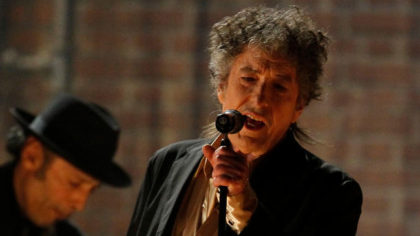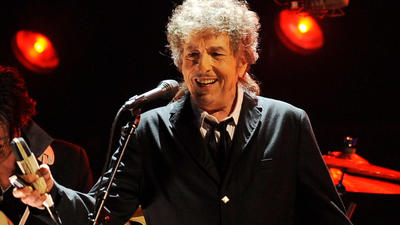
«Well, Shakespeare, he’s in the alley
Speaking to some French girl
Who says she knows me well»
(Los Angeles)He was the kid on the coffee house stage growling out songs from behind a guitar that seemed to weigh more than he did. He spoke of the gamblin’ man, the thin man, but T.S. Eliot too in songs that honored the roads full of the mud and the chimes of freedom flashing. He was the rebel, the healer, the bard in blue jeans and over-sized shades who sang a generation through war and peace, past the perils of unrest and self-complacency; every time we thought we had him pegged, he tried something new, writes Los Angeles Times..
For decades, many have considered Bob Dylan the great American poet, and now it is official: On Thursday, he became the first musician to be awarded the Nobel Prize in literature.
Since 1901, the prize has served as the pinnacle of literary achievement. Awarded for a lifetime body of work, it has gone to novelists, poets and playwrights such as Gabriel Garcia Marquez, Saul Bellow, Samuel Beckett, William Faulkner and Aleksandr Solzhenitsyn. The last American to receive the prize was Toni Morrison, in 1993.
And now Dylan has entered that pantheon, shoving against the boundaries of the definition of “literature” just as he pushed past so many borders in music.Indeed, the Swedish Academy awarded him the prize “for having created new poetic expressions within the great American song tradition.”
For many, the announcement was simple affirmation — Bob Dylan has been considered by many to be a, if not the, preeminent modern American poet; his songs are taught as poetry at colleges around the country.
Salman Rushdie tweeted, “From Orpheus to Faiz, song & poetry have been closely linked. Dylan is the brilliant inheritor of the bardic tradition. Great choice. #Nobel.”
For others it was a questionable choice, an encroachment by popular culture into one of the few arenas that still proudly considers itself elite.
“Look, Bob Dylan isn’t for me, but I get he’s a great artist. But the Nobel might as well have given the prize to your dad’s fave dorm poster,” tweeted comedian John Hodgman. “ But there’s only one Nobel, and so many authors and poets who haven’t a millionth of Dylan’s profile/validation.”
For members of either camp, it was a bold and surprising choice; when his name was announced at the Swedish Academy, a murmur of surprise went around the room.
Dylan released no public comment Thursday on the award. He was scheduled to perform at the Cosmopolitan of Las Vegas.
The artist, who lives in Malibu and is playing at Desert Trip in Indio this weekend, has been part of the Nobel conversation for years — in 2011 he first appeared on the betting site Landbrokes, and was in fact in eighth place on the site this year. (The Swedish Academy does not release official lists of finalists.)
But literary watchers have never considered him a serious contender. In fact the first English-language question Sara Danius, permanent secretary of the Swedish Academy, was asked ended bluntly with: “Does he really deserve the prize?”
“Of course he does, he just got it. He is a great poet,” Danius replied. She linked Dylan’s work to the ancient oral tradition, citing Homer and Sappho, who “wrote poetic texts that were meant to be listened to, meant to be performed, often together with instruments. It’s the same way with Bob Dylan.”
Still, it’s a shock that a musician cited for his lyrics and music has won the world’s most important literature prize. The Nobel has previously been confined to writers working in text alone — poetry, prose and plays.
But the prize also usually goes to a writer well into a long career whose work often reflects a social conscience.
In that, Dylan fits.
“He made you think,” said Robert Hilburn by phone Thursday. Hilburn, who has attended many Dylan performances, also had many sit-down interviews with the musician during his career as a music critic at the Los Angeles Times. “He was talking about life, politics, civil rights — he made music the equivalent of books.
“Look at all the great writers. When you talk about words having an effect on people around the world for generations — his words make us dream, they inspire us, they comfort us, they exhilarate us…. You could have given him this prize 20 years ago for the cultural revolution he created with just words.”
Bob Dylan was born Robert Allen Zimmerman in Minnesota in 1941. His story — by now well known — includes traveling to New York, giving himself a new name, and embarking on a career in folk music.
He played in coffee houses and clubs in Greenwich Village, infusing the great American longing of Woody Guthrie with the more modern concerns of his generation — war, civil rights, sexual repression — stretching the traditional ballad deep and wide with street-level observation and stream-of-conciousness.
Early songs, including “The Times They Are a-Changin’,” “Blowing in the Wind” and “Like a Rolling Stone,” became, and remain, anthems for the 1960s counterculture, and Dylan himself, a waif with a voice that redefined “raw,” became an icon of an iconic times; his steadfast refusal to accept the title “voice of a generation” only cemented his image as such.
As the Vietnam War raged, so did he, taking on what many considered a hypocritical government,writes Los Angeles Times..




